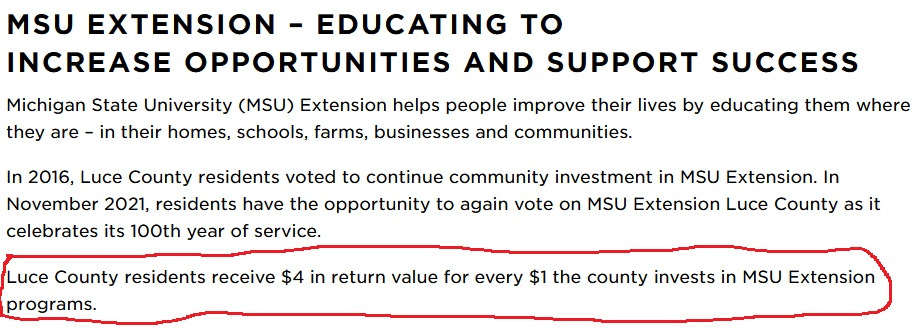Everyone knows that Michigan State University (MSU) is a place where students can get an education and earn an accredited degree, but what is MSU Extension? MSU Extension is an outreach organization that is active in counties all over the state. In Ottawa County they run the well-known program 4-H, and are very active in the agriculture industry by performing research and helping farmers with management activities such as taxes, insurance, and estate planning. Additionally, they offer classes for community members, podcasts, and videos. Some classes offered to Ottawa County residents in January 2024 included Virtual Mental Health First Aid, Adulting 101, and Relax: Alternatives to Anger. They share information on food manufacturing labeling requirements, trade shows, and understanding the tourism industry. MSU Extension is an advocate for Covid-19 vaccination and has several videos sharing the benefits on their webpage.
MSU Extension is a community stakeholder that has learned to leverage relationships between governments, businesses, non-profits, and taxpayers. Ottawa County provides MSU Extension with $272,000 (p.2) of funding annually, and MSU Extension has their own mileage in several counties around the state including these three examples.
According to the MSU Extension Luce County webpage, “Luce County residents receive $4 in return value for every $1 the county invests in MSU Extension programs.”
This quote is very interesting because Barbara Lee VanHorssen frequently makes a very similar claim when talking about the value of Momentum Center activities. (41:19)
The above statement is not the only thing MSU Extension has in common with the Momentum Center. In recent years, MSU Extension has had an increased focus on mental health, and has been working to address mental health crisis in farming communities and in schools. MSU Extension points to weather, changing federal regulations, the difficulty of separating work and personal life since farmers typically live at their work location, navigating the world of agritourism, and working with family members as causes of farm stress.
To help address mental health stress in schools, MSU Extension has received grant funding. In 2022 they received $1.55 million from the Office of Justice Programs to provide school communities with training to counter the effects of youth mental health crisis and reduce bullying. In 2023, they received over $350,000 from AmeriCorps and the Michigan Community Service Commission for a youth mental health and wellbeing project referring to increased challenges among BIPOC and LGBTQ youth. The announcement quoted a study that attributed some mental health issues to white supremacy, structurally racist policy decisions, and racism of all kinds.
Locally, Chris Kleinjans is employed by MSU Extension. He is also a member of the community mental health (CMH) board and part of the Ottawa Food board. According to Ottawa County’s 2022 Annual Report, the Snap-Ed program supported by MSU Extension partnered with Ottawa Food to teach children about eating healthy. The program was implemented through the Ottawa Community School Network which receives funding from the mental health millage through the CMH board. It seems Kleinjans has had involvement with all three partnering organizations.
With stakeholders working together on initiatives that impact the community it is oftentimes difficult to determine where one organization ends and another begins. Responsibility is blurred as is accountability. The initiatives are commonly funded by higher-level government organizations and non-profits and presented to community members as benefits. While some initiatives may be beneficial, we find it hard to believe that cost-effective programs are truly being practiced due to all the supporting management structures in place (aka overhead). They may tell us that these programs return $4 for every $1 spent, but we have yet to see any hard evidence to back their claims.




